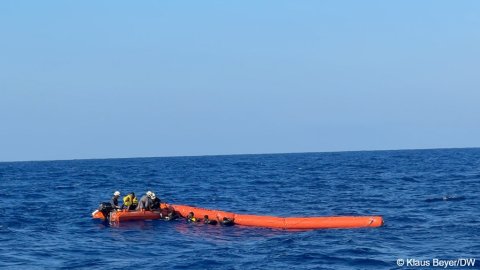Growing Dangers in Mediterranean: Boat Safety Concerns Rise
The Mediterranean Sea has long been a route for migrants seeking a better life in Europe, but the risks associated with these journeys are escalating dramatically. The rise in deadly incidents involving overloaded boats has raised serious safety concerns among humanitarian organizations and governments alike. As the number of crossings increases, so too do the dangers faced by those embarking on this perilous journey.
Increased Migration Pressure
Recent years have seen a significant uptick in migration across the Mediterranean, with many individuals fleeing conflict, persecution, and economic hardship in their home countries. The challenges faced by these migrants are compounded by the lack of sufficient monitoring and safety checks on boats used for these crossings. The question arises: who is responsible for ensuring the safety of these vulnerable individuals?
Humanitarian organizations have pointed out that many boats are not seaworthy, leading to tragic incidents where lives are lost at sea. The need for comprehensive safety measures and interventions has never been more urgent.
The Role of Authorities
Authorities in various countries have been criticized for their inadequate response to the migration crisis. With a lack of oversight, many boats are allowed to leave shores without proper checks, raising the question of accountability. The recent rise in incidents has sparked debates about the responsibilities of government agencies and non-governmental organizations in ensuring the safety of migrants.
In light of these issues, some have called for the implementation of more stringent regulations regarding boat safety. This includes the necessity for boats to be equipped with life jackets, communication devices, and other safety gear before embarking on a journey across the Mediterranean.
Humanitarian Efforts and Challenges
Despite the dangers, many humanitarian organizations are actively working to assist migrants. They provide essential resources and support, including food, medical care, and psychological assistance. However, these efforts are often hampered by bureaucratic hurdles and a lack of funding. Many NGOs find it challenging to operate amid strict regulations imposed by various governments, which can hinder their ability to respond effectively to emergencies.
Furthermore, in some regions, the Department of Homeland Security (DHS) has been criticized for its handling of immigration cases, leading to confusion and anxiety among migrants. The rise in humanitarian parole programs has offered some hope, but these initiatives require careful implementation and resources to be effective.
Community Responses
Local communities are increasingly becoming involved in supporting migrants. Grassroots organizations and volunteers are stepping up, providing assistance and advocating for better policies. In some areas, community-driven initiatives have emerged to offer shelter, legal aid, and other essential services to migrants in need.
However, the growing hostility towards migrants in certain regions poses a challenge. Community members often face pressure and fear of reprisals for extending assistance, making it essential for broader coalitions to stand in solidarity with those in need.
Future Considerations
As we navigate the complexities of migration in the Mediterranean, it is crucial to recognize the importance of safety and humanitarian support. The escalating dangers highlight the urgent need for cohesive strategies that address both the immediate and long-term needs of migrants.
Key considerations include:
- Strengthening Safety Regulations: Governments must implement and enforce regulations that ensure the safety of boats and migrants.
- Enhancing Cooperation: Collaboration between nations, NGOs, and local communities is essential to create a comprehensive response to the crisis.
- Increasing Resources: Adequate funding and resources must be allocated to humanitarian organizations to enhance their ability to respond to emergencies effectively.
- Public Awareness: Raising awareness about the challenges faced by migrants can foster empathy and support for more humane policies.
In conclusion, the escalating dangers in the Mediterranean demand urgent action from governments and humanitarian organizations. By prioritizing safety and support for migrants, we can work towards a more compassionate and effective response to the ongoing crisis. Ensuring that no one is left to face these dangers alone is a collective responsibility that requires immediate attention and action.










